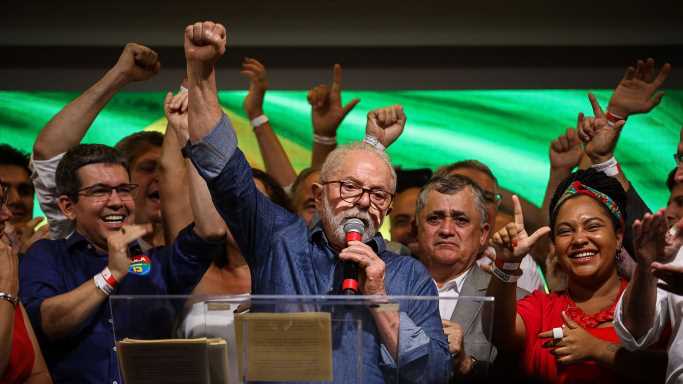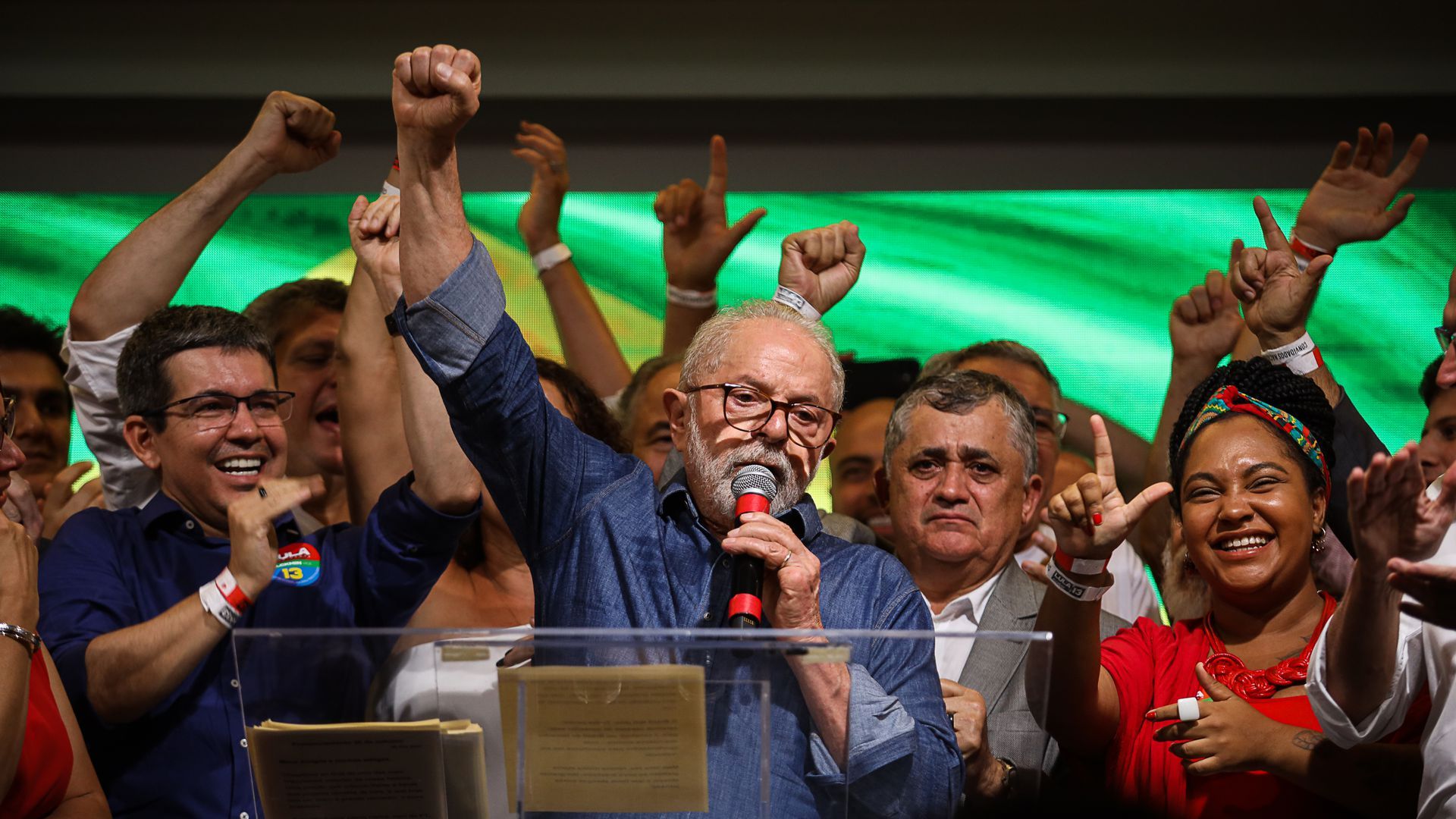Luiz Inacio Lula da Silva celebrates his victory in Sao Paulo, Brazil. Photo:Danilo Martins Yoshioka/Anadolu Agency via Getty Images
The shift from President Jair Bolsonaro to President-elect Luiz Inácio Lula da Silva brings a sea change not only for Brazil itself, but also for the global role of Latin America's largest country, economy and diplomatic power.
Why it matters: Lula’s victory means that all of Latin America’s largest countries and economies will be led by left-wing leaders. He has big ambitions to bring that burgeoning bloc closer together and to restore Brazil's tarnished global stature, especially on environmental issues.
- “It was my government that gave citizenship to Brazil in the realm of international relations. Never before in the history of Brazil was Brazil so respected in the world," he claimed in one presidential debate.
- Andre Pagliarini writes in the SAIS Review of International Affairs that Lula "will all but certainly resume his project of positioning Brazil as an independent power capable of negotiating equally as well with the West and East."
- “[H]e will seek to harness the goodwill he is likely to receive early in his administration from the foreign press, world leaders, and multilateral institutions to that end,” Pagliarini adds.
Flashback: In his previous tenure (2003-2010), Lula pursued a geopolitical role in line with Brazil's surging economy. On his watch, Brazil led an international intervention in Haiti and attempted nuclear diplomacy with Iran.
- Lula clashed at times with the U.S. over the Iraq war and a proposed hemisphere-wide trade deal, which he helped block over an agriculture subsidies dispute.
- He also cultivated close ties with China — one of several areas that could spark tensions with Washington this time around. "The BRICS will be back," a U.S. official told Axios unenthusiastically, referring to the partnership between Brazil, Russia, India, China and South Africa that Lula helped to forge.
State of play: Bolsonaro’s attacks on Brazil’s electoral system alienated him from Biden's White House, but he generally aligned with the U.S. on regional issues like Cuba and Venezuela, and the Trump administration named Bolsonaro's Brazil a major non-NATO ally.
- In contrast, Lula’s views on protecting the Amazon and Brazilian democracy have been welcomed by Washington, but his long-standing ties with leaders in Cuba, Nicaragua and Venezuela could "become a point of friction," says Lauri Tähtinen of the Center for Strategic and International Studies.
- Lula also raised eyebrows during the campaign when he claimed in a TIME magazine interview that Ukrainian President Volodymyr Zelensky wanted warwith Russia.
What they're saying: "Problems might arise if the United States doesn’t understand that Latin America wants to be independent. And that means not being anyone’s backyard," Lula’s close confidante and former foreign minister Celso Amorim told the Nation in August.
- “For instance, our trade with China now is very important,” he continued. “It is impossible not to have good relations with China.”
Between the lines: Brazilian leaders across the political spectrum bristle when U.S. and European leaders try to lecture them, Tähtinen says, noting that the BRICS format is useful in part because it puts Brazil on a par with other non-Western global powers.
- "It would behoove the Europeans and Americans and Brits to come up with parallel processes and forms of engagement that give Brazil a similar kind of peer-level status," he says.
- On a regional level, Tähtinen expects many gatherings and new institutions of the sort Lula spearheaded previously. But he's skeptical that Lula will truly achieve deeper regional integration, such as his idea for a currency union.
What to watch: Brazil's circumstances have changed since Lula left office, largely due to to a decade-long economic slump. Brazil's internal political turmoil might make it more difficult to focus on events beyond his borders.
- But after years of relative international isolation under Bolsonaro, Brazil's global profile is about to change dramatically.
Source: Read Full Article
-
Bloke bitten by family member and almost loses leg to flesh-eating bacteria
-
Multi-millionaire businessman ignores objections from village locals
-
New fire prompts evacuation as survivors of Maui’s wildfires return after death toll rises to 67 – The Denver Post
-
Conservatives slam 'anti-man' hit film Barbie
-
Hamas beast who paraded murdered Shani Louk’s naked body through Gaza has been KILLED, claims top rabbi | The Sun


